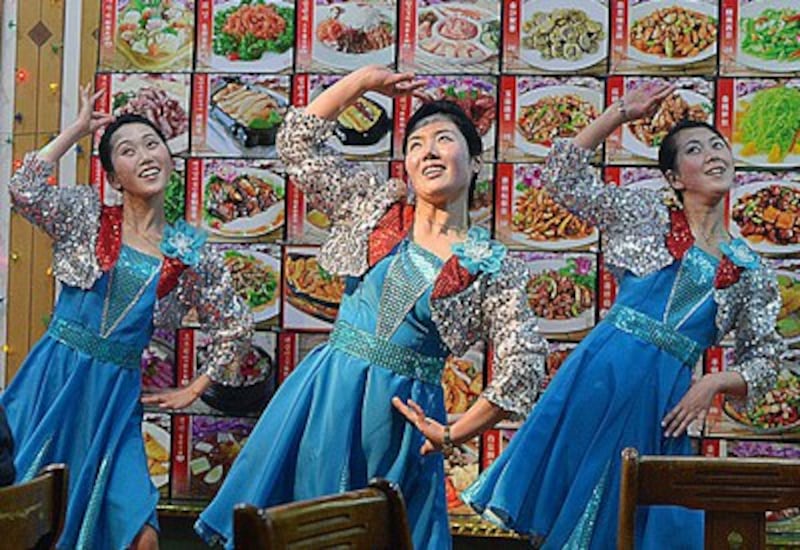Some North Korean restaurants in China are trying to boost their numbers of diners amid increasing financial difficulties resulting from strained relations between the two allies following the North’s recent nuclear test and missile launches, North Korean sources in China said.
The North Korean restaurants, faced with financial difficulties caused by the decrease in the number of clients, are desperately trying to find ways to attract more people and asking patrons to come again and bring others with them, the sources told RFA's Korean Service.
In February, North Korea defied international warnings and launched a long-range rocket just a month after testing a nuclear device, resulting in condemnation from the international community and harsh new sanctions by the United Nations Security Council. The sanctions prompted North Korean leader Kim Jong Un to order his military to be in “preemptive attack” mode, ready to use its nuclear weapons at any time.
“Ethnic Koreans in Yanbian enjoy going to North Korean restaurants on special occasions like birthdays because their palates are similar to those of North Koreans,” said a source, referring to the autonomous prefecture in northeastern China's Jilin Province just north of the border with North Korea.
“The food there is not that great, but the restaurant-goers especially enjoy the singing and dancing of young North Korean waitresses,” the source said. “But because of the tense political situation after North Korea’s nuclear test and missile launch, the restaurants are mostly vacant.”
Many North Korean restaurants in Yanbian have downsized or relocated during winter, and locals believe most of the establishments in China might eventually close because they are not making money, he said.
Ethnic Koreans also visit North Korean restaurants out of curiosity about the North’s people who are isolated from the rest of the world, but they do not patronize the establishments often because of the lack of quality and quantity of food for the high-priced meals, he said.
But some North Korean restaurants that have spruced up their in-house shows and scaled down the size of their restaurants in light of dwindling finances, appear to be thriving, he said.
Such eateries have made an extra effort to attract more customers by poaching young North Korean women who work at other North Korean restaurants.
Food for hard currency
The North Korean restaurants that operate abroad serve as a source of foreign currency for the cash-strapped North Korean government to which they reportedly must remit tens to hundreds of thousands of U.S. dollars annually.
One popular chain of restaurants aptly named Pyongyang after the North Korean capital operates restaurants mainly in China near the North Korean border, but has been expanding since early this century to other Asian countries, including Cambodia, Vietnam, Laos, Thailand, Malaysia, Indonesia, Mongolia and Bangladesh.
The restaurant chain is owned and operated by Korea Pyongyang Haedanghwa Food Stuff Company Ltd., a North Korean government entity and employs staff from North Korea who are closely monitored by security agents of the regime.
Pyongyang’s famous Okryugwan, or Okryu Restaurant, also has outlets throughout China and other Asian countries, including Vietnam, Thailand, Cambodia, Laos, Mongolia and Russia.
The restaurants serve Korean food, including kimchi, a fermented vegetable side dish, Pyongyang-style cold noodles known as raengmyeon in North Korea, dog meat soup, and kalbi, grilled dishes made with marinated beef short ribs, as young North Korean women in traditional choson dresses play instruments and sing karaoke.

Send in the ladies
A North Korean defector who had recently visited a North Korean restaurant in China told RFA that quite a few customers were dining there, although he had expected it to be empty.
He also said he was not afraid to eat in the North Korean restaurant because there were no security guards manning the entrance, which made him feel welcome.
The defector ordered Pyongyang-style cold noodle soup “out of nostalgia for the food from my childhood,” he said, but lamented that few diners in the place actually watched the performance.
“As more customers came in, [restaurant staff] made phone calls to other North Korean restaurants to request that more ladies be sent for the new customers,” the source said.
North Korean restaurants that have opened in countries further afield have failed to thrive.
The Pyongyang restaurant chain made a brief and unsuccessful foray into Western Europe in 2012 by opening a branch in Amsterdam, which later closed because of a spat between the Dutch co-owners and their North Korean staff who claimed they were were being exploited and improperly compensated, according to media reports.
The restaurant reopened at the end of 2013 under the name Haedanghwa Korean Restaurant, but closed the following year.
Reports surfaced in January 2015 that the Pyongyang chain was considering opening a restaurant in Edinburgh, Scotland, but North Korea denied it.
Written by Jieun Kim for RFA’s Korean Service. Translated by Hee Jung Yang. Written in English by Roseanne Gerin.
